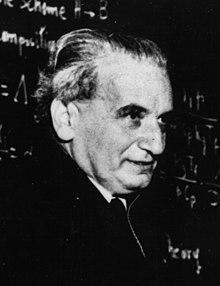Von Karman
Theodore von Kármán (Hungarian: szőllőskislaki Kármán Tódor [ˈsøːlːøːskiʃlɒki ˈkaːrmaːn ˈtoːdor]; 11 May 1881 – 6 May 1963) was a Hungarian-American mathematician, aerospace engineer, and physicist who was active primarily in the fields of aeronautics and astronautics. He is responsible for many key advances in aerodynamics, notably his work on supersonic and hypersonic airflow characterization. He is regarded as the outstanding aerodynamic theoretician of the twentieth century.
Kármán was born into a Jewish family in Budapest, Austria-Hungary as Kármán Tódor. One of his ancestors was Rabbi Judah Loew ben Bezalel. He studied engineering at the city's Royal Joseph Technical University, known today as Budapest University of Technology and Economics. After graduating in 1902 he moved to the German Empire and joined Ludwig Prandtl at the University of Göttingen, where he received his doctorate in 1908. He taught at Göttingen for four years. In 1912 he accepted a position as director of the Aeronautical Institute at RWTH Aachen, one of the leading German universities. His time at RWTH Aachen was interrupted by service in the Austro-Hungarian Army from 1915 to 1918, during which time he designed the Petróczy-Kármán-Žurovec, an early helicopter.
...
Wikipedia

